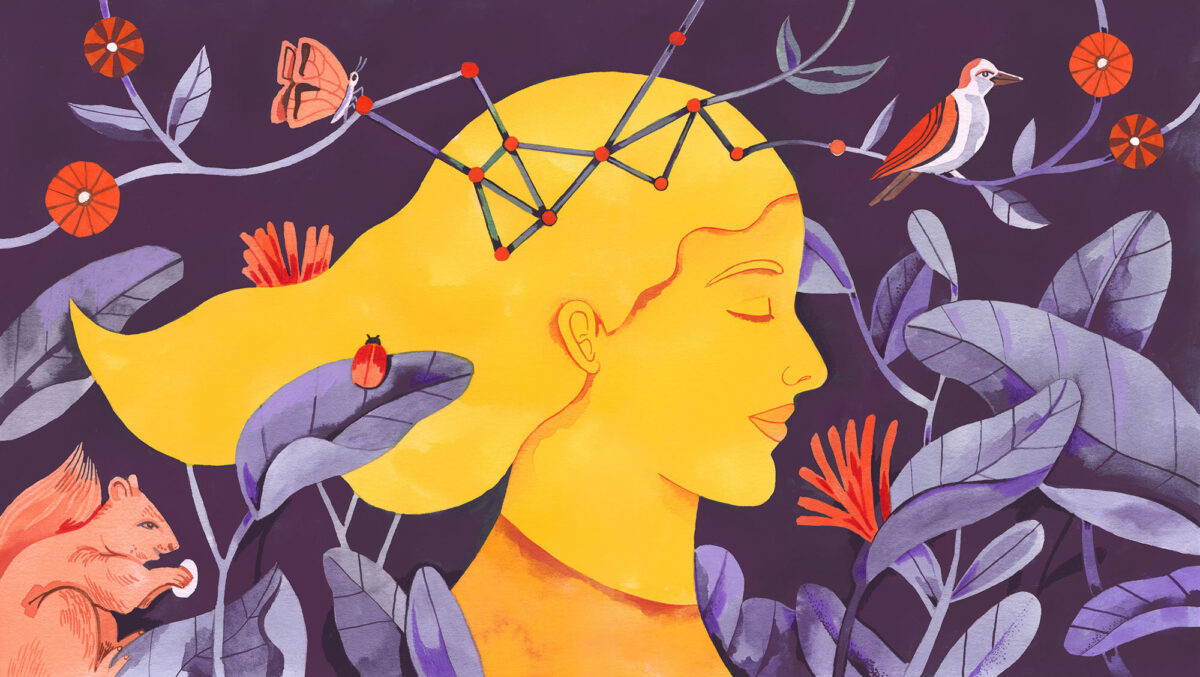Nature reserves that safeguard native biodiversity are not only critical for climate change mitigation, but also for our mental health. A few aspects of well-being come to mind: calmness, fresh air, and sunlight. What many don’t realize is that the health benefits of nature extend beyond ideas of recreation, gardening, ecosystem maintenance, and colorful landscapes.
The field of ecopsychology is relatively new and rapidly expanding. It seeks to quantify the vast array of effects nature has on human brains. In a world full of concrete jungles, technology, and busy schedules, we often assume we’re far along the path of our own progress and have adapted to this age of the anthropocene. But, our minds are more evolutionarily adapted to the earth than some researchers anticipated. As we exist in nature, our brains turn on alpha brain waves, associated with an enhanced ability to learn, create, and intuitively think through a relaxed state of mind. Trees, parks, mountains, and gardens, although seemingly less informative than books, may serve as some of our greatest teachers.
Though it was thought through the Enlightenment period to spur introspection and intense reflection inaccessible in other environments, nature calms us by doing the opposite, according to 2015 research from Stanford University. Our subgenual prefrontal cortex is activated in many cognitive functions, and an overactive prefrontal cortex can lead to aggression, irritability, and blunt emotional responses. Stanford researchers point out that people who walked through forested parks exhibited reductions in neural activity and rumination in the same area of the brain. The results were not shown for those who walked in urban areas, eliminating the possibility that the findings were related to the act of walking alone. Nature, experienced through the senses, essentially takes us out of our minds. When our prefrontal cortex is ruminating, we neglect the world around us and churn the same memories and thoughts through our heads, causing higher levels of stress, anxiety, and depression. In contrast, when experiencing nature and focusing on our senses, our prefrontal activity slows and we forget to overthink as we take in the beauty around us.
Why is nature so much better at regulating our brains and bodies than the environments we’ve created in cities? Urbanized areas aim to create comfort and convenience in our society, and there certainly is enough to consume through the senses. There is currently what scientists call a “state of mismatch” among what we were evolved to sense and what is actually available to us most of the time. We are simply more equipped to handle stimuli from the natural environment, and they have profound impacts on our psychological well-being. Our senses define our reality, but only when we give ourselves space to attend to them.
What we see largely dictates how we feel, and sight is often considered the most important sense humans have evolved. Nature offers us something visually that buildings and even social settings rarely evoke: awe. Awe is surprisingly a very underestimated emotion, considering that research shows it leads to healthier and happier lives through lower levels of stress and inflammation. Awe combines our fear and respect of nature and brings us to a state where we are increasingly aware that the world is bigger than we are. Because of this, experiencing awe brought on by experiences in nature leads us to exhibit more humble and prosocial behavior. Of course, awe can be experienced through looking at city skylines, but what is unique about spending time outside is you don’t need to climb mountains or swim in waterfalls. Even the smallest doses of fresh air, including city parks, have been shown to provoke the awe reaction we are built to enjoy.
The second sense that nature impacts is hearing, as it stops us from overthinking and brings us into the present moment. Parks and conservation areas provide a habitat for a highly effective auditory medicine: birds. When we hear birds, our brains recognize cues from the environment that were particularly helpful during periods of human brain development in our evolutionary past. When our ancestors were in survival mode, their sympathetic nervous system was activated; they were in a state of fight or flight. Birds, who also needed to survive, would only sing when there weren’t threats from predators. Human nervous systems actually follow this pattern, and when we hear birds our parasympathetic nervous system is activated and our digestion increases while our respiratory and heart rates decrease. These physical responses play into the relaxation of our minds. In today’s world, we are almost always on defense, even when we are consciously attempting to calm down. The hum and buzz of modern life contributes to heightened fight or flight responses. Noise pollution negatively impacts cognition and causes oxidative stress, which is an imbalance of free radicals and antioxidants in the brain. Our minds are registering many more sounds than we would normally think, and although we are evolutionarily programmed to tune things out, there is still auditory processing associated with excessive stimuli. National parks are increasingly disturbed by noise from roads and human activity, with no thought towards the more unknown mental health benefits of peaceful, protected natural areas.
Another overlooked healing power of trees, gardens, and other natural areas is through scent. Petrichor, a Greek-derived name for the way the earth smells after it rains, is more advantageous for our health than we may initially realize. When it rains, bacteria in soils release a chemical called geosmin. Geosmin is highly detectable by humans, who are surprisingly alert to its presence. Humans have adapted to detect geosmin levels at concentrations as low as 0.1 parts per billion, likely because early Homo sapiens relied on rain for survival. Geosmin is a kind of phytoncide, a chemical from native flora and bacteria. Phytoncides are antibacterial, and geosmin comes directly from the streptomyces, bacteria in soil that are crucial to many antibiotics. If there’s a way to gain antibiotic effects without directly consuming them and fighting antibiotic resistance, exposure to earth after rain could be a decent starting point. Phytoncides also incorporate terpenes. Plants, particularly conifers, produce terpenes that are largely responsible for their aromas. Pinene, in particular, lowered heart rates in people who took nature walks. In a world where yoga retreats and spas are prescribed for relaxation, nature may be vastly more effective in delivering a brain rest from the influx of demands we experience daily.
Japanese society has already taken these concepts and implemented them on a wider scale. Shinrin-Yoku, also known as forest-bathing, has been scientifically proven to heighten immune responses, lower blood pressure and heart rates, and reduce production of stress hormones. Forest bathing has a minimal requirement of being in the presence of trees, something not everyone can find. To incentivize increased forest access, forest-bathing has been part of public health programs in Japan since 1982. People practicing Shinrin-Yoku are shown to exhibit lower levels of cortisol, the primary stress hormone, compared to individuals walking through a city for the same amount of time.
Knowledge about the effects of nature exposure on our minds and bodies is only recently being expanded with fields like eco-somatics, ecopsychology, and ecotherapy which have evolved to study our innate connection to the earth. Indulging our senses with the outdoors continues to prove beneficial in an age where work, school, and home life increases our time indoors. Protecting areas for people to experience the scientific benefits of being in nature makes for an even more persuasive argument for protecting the planet. We enjoy it, and it’s the only landscape that most of our fundamental anatomy truly understands. Connecting back to nature involves connecting back with ourselves, and radically correcting assumptions that humans can live in the absence of green.
Sources
Daily, Gretchen C. “Nature experience reduces rumination and subgenual prefrontal cortex activation.” NCBI, https://www.ncbi.nlm.nih.gov/pmc/articles/PMC4507237/.
Goecker, Liesl, and Ananya Singh. “Why Listening to Nature Sounds Has Such a Powerful Effect on Mood.” The Swaddle, 18 March 2021, https://theswaddle.com/why-listening-to-nature-sounds-has-such-a-powerful-effect-on-m ood/.
Korte, Andrea. “Surroundings and Evolution Shape Human Sight, Smell and Taste.” AAAS, 20 February 2017, https://www.aaas.org/news/surroundings-and-evolution-shape-human-sight-smell-and-taste.
Li, Qing. “Effects of forest environment (Shinrin-yoku/Forest bathing) on health promotion and disease prevention —the Establishment of “Forest Medicine”—.” NCBI, https://www.ncbi.nlm.nih.gov/pmc/articles/PMC9665958/.
Livni, Ephrat. “The Japanese practice of ‘forest bathing’ is scientifically proven to improve your health.” Quartz, 12 October 2016, https://qz.com/804022/health-benefits-japanese-forest-bathing.
“Parasympathetic Nervous System (PSNS): What It Is & Function.” Cleveland Clinic, 6 June 2022, https://my.clevelandclinic.org/health/body/23266-parasympathetic-nervous-system-psns.
“Screen time linked to risk of myopia in young people: High levels of exposure can increase risk of short-sightedness by up to 80%.” ScienceDaily, 7 October 2021, https://www.sciencedaily.com/releases/2021/10/211007122131.htm.
“Therapeutic Potential of α- and β-Pinene: A Miracle Gift of Nature.” NCBI, 14 November 2019, https://www.ncbi.nlm.nih.gov/pmc/articles/PMC6920849/.
Thompson, Jonathan. “Alpha state of mind.” Atlassian, 14 January 2022, https://www.atlassian.com/blog/productivity/alpha-brain-waves-are-associated-with-a-flo w-state-of-mind-heres-how-to-ride-yours.
“What Awe in Nature Does for Us.” Outside Magazine, 23 July 2019, https://www.outsideonline.com/podcast/science-of-awe-nature-mental-health/.
“Why are humans so good at smelling rain?” The Healthy Journal, https://www.thehealthyjournal.com/faq/why-are-humans-so-good-at-smelling-rain.
Williams, Florence. The Nature Fix: Why Nature Makes Us Happier, Healthier, and More Creative. W. W. Norton, 2017.

